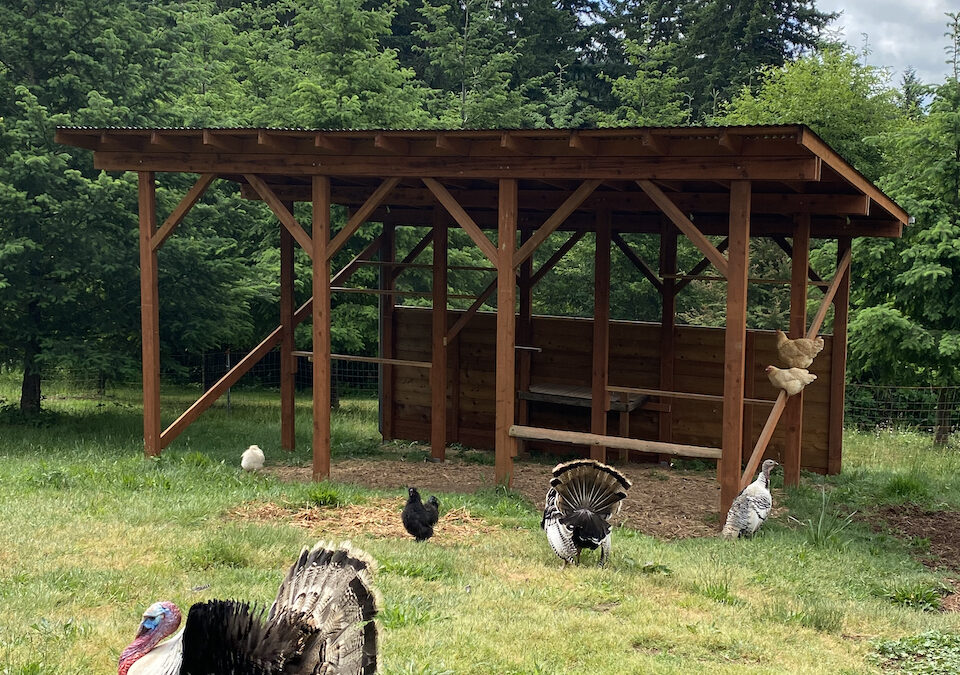Raising baby turkeys, also called poults, can feel intimidating for beginners. There are a few important differences to be aware of when raising turkey poults as compared to raising chicks. Heritage turkeys are very healthy and hardy as adults, but perhaps surprisingly, the young poults are fragile and more easily stressed than chicks. Your poults will need a little extra care than you may be used to providing for chicks in order to ensure that they have a healthy start to life. Join turkey expert and published author, Stacy Benjamin, as she shares how to raise turkeys for beginners.
Brooding Poults
Brooding poults requires a few different techniques as opposed to other types of poultry and waterfowl. First and foremost, when setting up the brooder, if you are using equipment that has been previously used, it is important that all of the equipment is sterilized.
Additionally, the brooder temperature for poults should be kept five degrees higher than it is for chicks at all stages of development. Poults can be easily chilled, so monitor them to be sure that the temperature is warm enough. If they are all huddled closely under the heat source, they are cold and you should lower the heat source. The brooder should be located in an area that is free from drafts, and if it is in an unheated area outside of the house, pay extra attention that the brooder is warm enough at night. You may need to raise or lower the height of the heating source as the outdoor temperature changes from day to night.
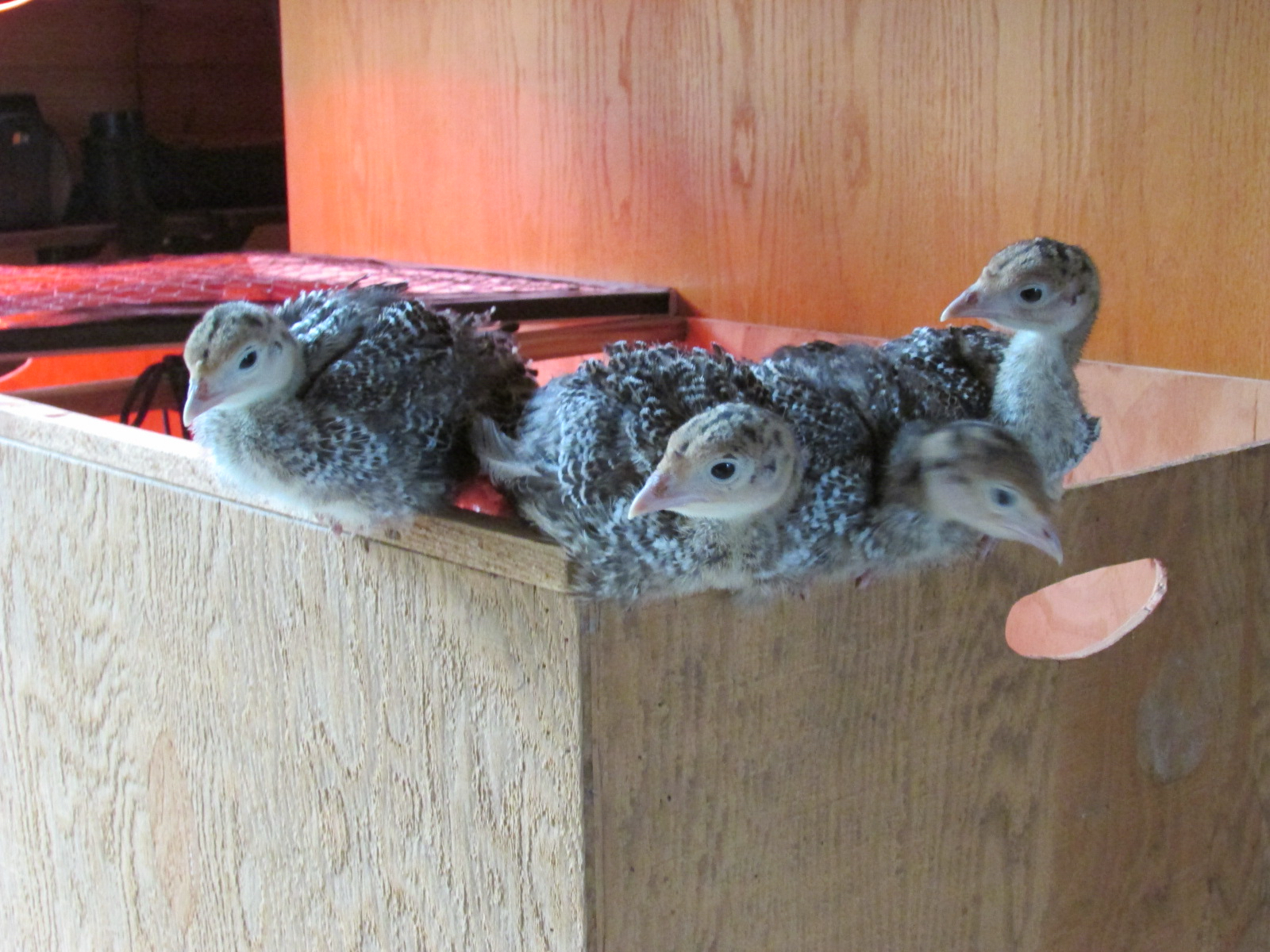
Minimizing Stress
For their first week, add vitamins and electrolytes to the poults’ water to give their immune system a boost. As the poults are settling into the brooder on their first day, watch them to make sure that all of the poults have figured out where the food and water are. Adding a few colored marbles (large enough so they cannot be swallowed) to their feeder and waterer will draw their attention and encourage them to eat and drink. You can also tap your finger in the feeder and waterer until they come to investigate.
Be sure to keep the brooder as clean and dry as possible and clean up any damp or dirty bedding promptly in order to reduce the risk of illness. Minimize handling your poults during the first several days as well to ensure they are eating, drinking, and being kept warm. As the poults become stronger and more active after their first few days, you can spend more time handling them. Always supervise children when they handle the poults to be sure that they are not causing additional stress.
Due to their delicate immune systems, poults should be kept off the ground until they are eight weeks old, especially if other poultry have been using the area, because poults can easily contract soil-borne illnesses. To jump-start their immunity, you can place a chunk of sod and dirt from their eventual pasture into their brooder when they are a week old.
Feed
It is very important to feed your poults a high protein starter feed. Do not feed them chick starter because it does not contain the nutrition poults need to develop properly. Feed your poults a specially formulated turkey starter. If you cannot find turkey starter, then game bird starter is essentially the same thing. The starter feed should contain 28%-30% protein. When poults reach six to eight weeks old, they should be transitioned to a developer/grower feed for turkeys. Check the feed bag instructions, as different brands and formulations vary. Once turkeys are about five months old, they can be transitioned to a flock maintenance or flock layer feed that you use for the rest of your adult flock.
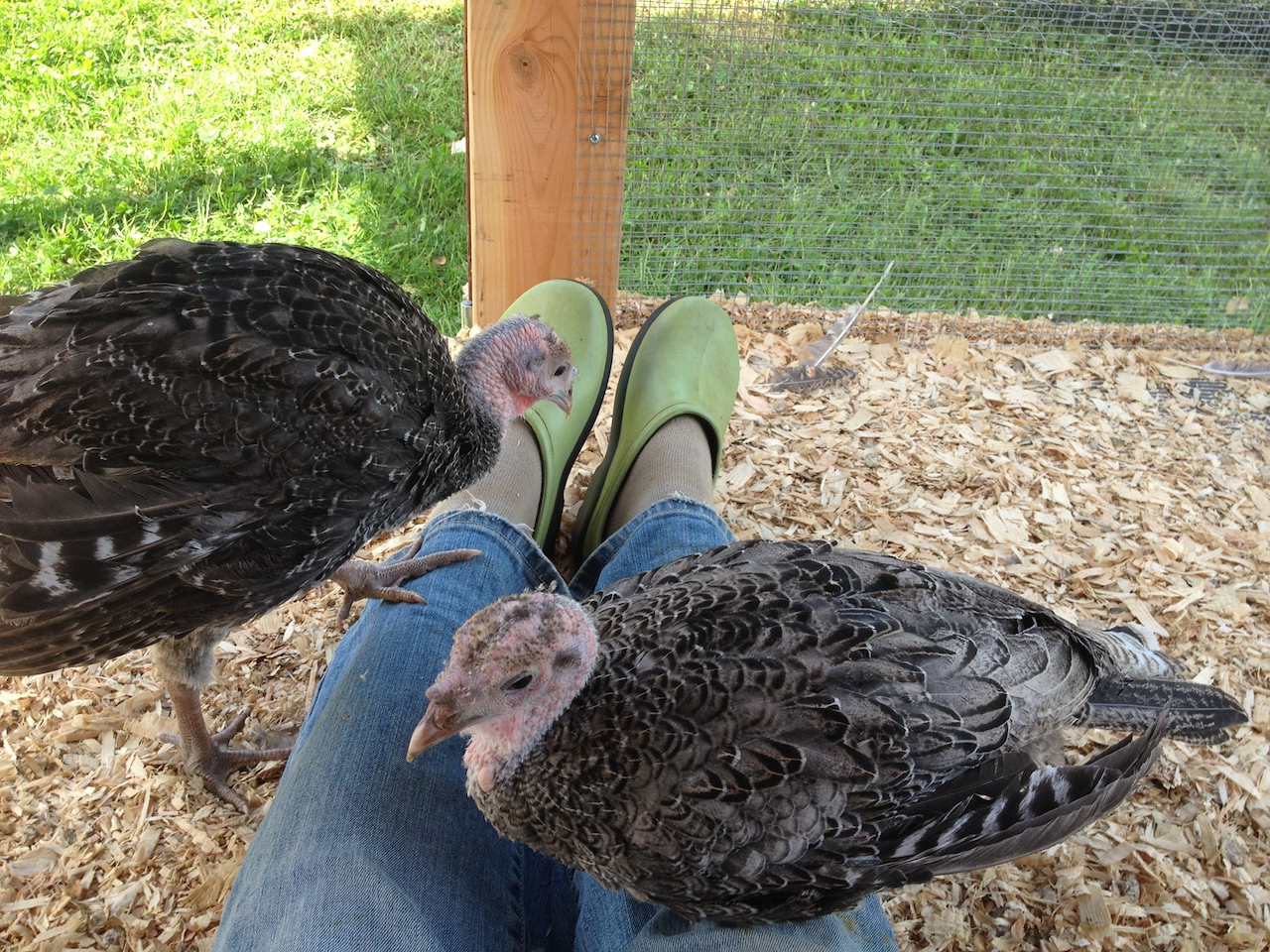
Housing
Poults grow quickly and they can fly high at a young age. If you are using a relatively small container for a brooder, you will find that they will rapidly outgrow it and will be ready for more space by the time they are a few weeks old. At this time they can be transitioned into their adult housing, but they should still be kept separate from the rest of the flock. A heat source should still be provided until they are fully feathered at about eight weeks old. Use this indoor time with your poults as a good opportunity for socializing them. The more time that you spend bonding with your turkeys as juveniles, the easier it will be to handle them as adults. You can give poults limited access to the outdoors with a sunporch, which is a screened area that can be built onto an exterior wall of their housing and that has a wooden floor to keep the poults off the ground.
Once your juvenile turkeys are given full access to the outdoors, you will find them to be very adventurous and independent when it comes to deciding where to settle in for the night. Turkeys prefer high roosts and open spaces, and they will often choose to sleep outdoors if the decision is left up to them. While adult turkeys can handle cold temperatures and sleeping outdoors, we all feel better knowing our birds are safely sheltered for the night. That is why it is important to be vigilant about trying to train your turkeys where they should sleep at night. Turkeys do not like small, enclosed spaces, so when planning their shelter keep in mind that a barn-style structure is more likely to be used by your turkeys than a typically smaller sized chicken coop. Provide your turkeys with a spacious shelter with a high roof and high roosting bars and encourage them to go inside (or chase them inside if they need more encouragement), otherwise you’ll risk having them take to the trees or a rooftop for the night. Once turkeys start to roost outdoors, it is very difficult to convince them to go back to sleeping indoors.
Housing Chickens and Turkeys Together
An important thing to know before getting turkeys is whether blackhead disease (Histomoniasis) occurs in the part of the country where you live. Blackhead disease is caused by a protozoan parasite that can be carried by chickens. While it is very rarely fatal in chickens, blackhead disease is easily spread to turkeys and is often fatal. Contact your local agricultural extension office to find out if blackhead disease occurs in your geographic area. If it does, then you should not keep turkeys in shared facilities or on the same ground that chickens have lived on within the last few years.
All photos are courtesy of Stacy Benjamin.
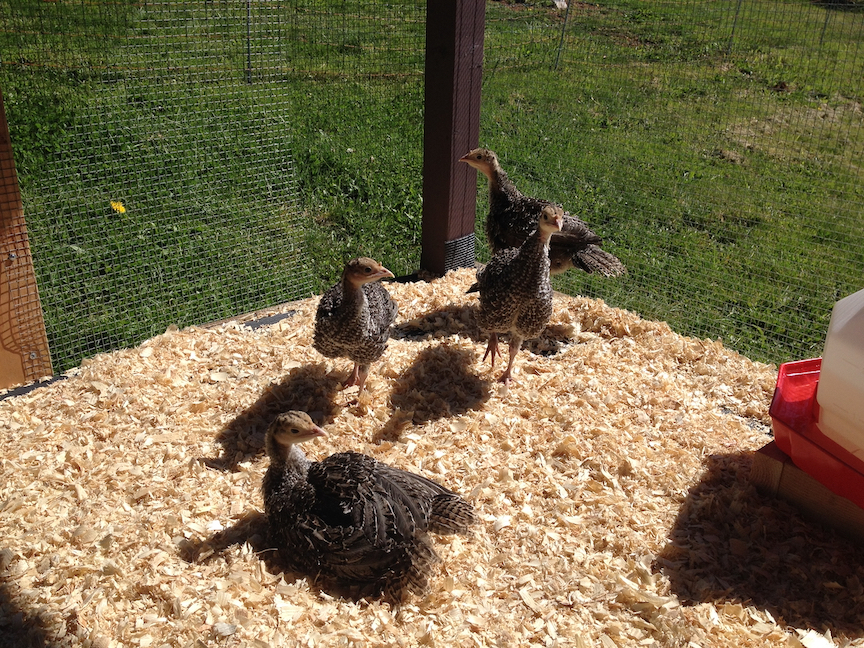
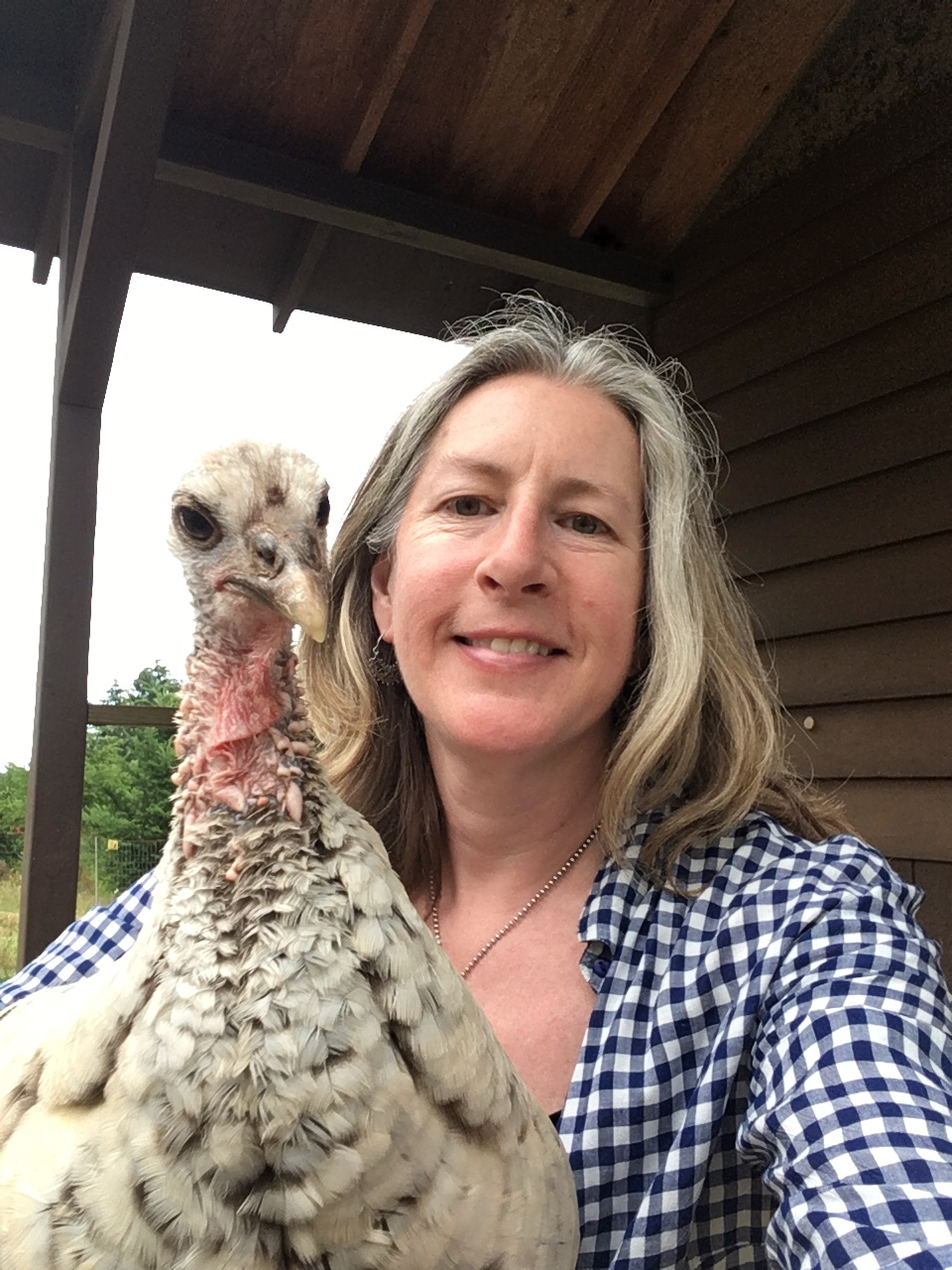
Stacy Benjamin is a poultry enthusiast, gardener, and beekeeper that credits her first five backyard chickens with her move from the city to the country. 5R Farm is named after Rhoda, Raquel, Rosie, Ruby and Ramona, and is where Stacy resides in St. Helens, Oregon with her husband and a flock of about four dozen very spoiled chickens and turkeys.
Stacy began raising Heritage Narragansett turkeys in 2015 and quickly fell in love with their larger-than-life personalities. She enjoys teaching about the joys of turkey ownership and encouraging others to add these beautiful and charismatic birds to their flock.
Stacy is a contributor to Backyard Poultry Magazine and Countryside Magazine, and is the author of An Absolute Beginner’s Guide to Raising Backyard Turkeys. Stacy shares the antics of her turkeys on her Instagram account @5rfarmoregon, and she blogs on her website at www.5Rfarm.com.

